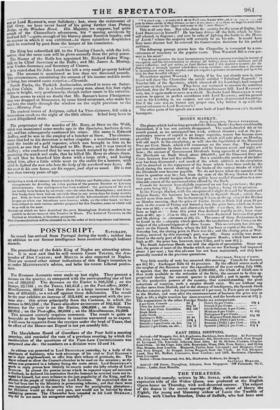An address was presented to Lord BROUGHAM yesterday, by a
body of the inhabitants of Salisbury, who took advantage of his visit to Earl RADNOR'S Sat in their neighbourhood, to offer him their tribute of gratitude, &e. The Mayor refused to allow the Council-chamber to he used on the occasion ; so the address was presented in a balcony facing the main street. Lord BROUGHAM'S Teeeh in reply proves how bitterly he smarts under the lofty rebuke of Lord pURIIAM. In almost the precise terms which he repeated untie ad nauseam In Scotland, he declared his conviction that the honours be received were not in- tended for himself, but were tributes to the just popularity of the King, and the rflection of the people of Salisbury for Lord RADNOR.. He maintained that no time had been lost by the Ministry in prosecuting reforms; and that there were Sate impatient people in the country who were for precipitating alterations ; at Ministers would go their own pace, and would not be hurried by those 'rethinking 'persons. The Chancellor here intended to hit Lord DURHAM; Why did he not name his antagonist manfully ? "510 soad ee,p, I, e said) to hi ar in men S A0/116 who ritt.0 ..11 .cud join in these cavds, it they cloture IAAlstm 411 •itl 14 Mei 11 Is thorVe we hope to meet their eritieisms—some in the Upper and some in the ! ower I louse."
This is all very fine. But who chose th, . mintry for the scene of display, but Lord BROUGI1AM himself ? He has been drivel' off the field, which he him- self selected, in disgrace ; and now he talks of fighting the battle in the House of Lords! where the majority will certainly he on his side. It would have been more discreet had he reserved his Conservative doctrines for his packed audience.
The following passage proves how the Chancellor is tormented by a con- ecionsness of treachery to the popular cause. That Warwick Bill is ever pre- sent to his mind !
" You do not perceive the least inconsistency between a person ro o%ing his hatred of corruption, and his determination to cleanse all bribery away from elections; and all undue influence. and yet eatiag, as Lord Raisin. and I cell. against a measure for dis- franchising a borough, against which there was no eridence ; any more than a juryman is inconsistent e ho bates murder, and yet acquits a prisoner erunseously put upon his trial for that dreadful offence."
No evidence against Warwick ! Surely, if he lets not already seen it, some friend will show the Chancellor the article entitled " Falsehood Exposed," in Number 325 of the Spectator, which silenced all his Lordship's loud-tongued paresans on that question. They have not ventured to reassert the notorious falsehood, that the Warwick Bill was a Disfranchisement Bill. Lord RA DNOR'S vote, too, is again made to serve as a shield. No doubt Lord BROUG its Al is very anxious to appear in perfect accordance with Lord RADNOR ; and hie present visit to his Lordship is, we suspect, not one of pure disinterested friendship. But if the vote was an honest and proper one, why bolster it up with this eternal reference to Lord RADNOR'S ?
The other parts of his speech are a mere hash of Lord BROUGHAM'S Scottish harangues.
















 Previous page
Previous page